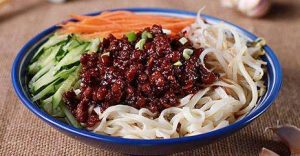(After Cold Noodle soup with Sophora Leaves, by Du Fu)
Yujing Wang
Emerald green are cucumbers, light purple is the sweet radish,
We shred them and leave them on the cutting board.
Handmade noodles are offered in the supermarket across the street,
They are bathed in cold water instantly after being boiled.
Minced pork is stir-fried with salted soybean sauce,
The toppings are evenly mixed with the noodles after being served.
I eat more, worrying that I may soon say farewell to my hometown.
Pleasant coolness is conveyed by the vegetables of summer,
A thick salty flavor from the sauce rolls on my tongue.
I urge my parents to have a try, proud of the dish I’ve accomplished.
I wish to bring the ingredients of this recipe when I travel,
Boasting about where I come from when such scent emerges from the kitchen.
My journey is long, I worry if the food could preserve,
But my love is deep and hard to alter.
A bowl of noodle may be trivial,
It’s connection with my city renders it irreplaceable.
Oceans away in Emory University,
My fellow students gulp the convenient meals from our cafeteria,
Anytime when I feel nostalgic,
This flavor is crucial for the occasion.
1. What piece did you choose to imitate?
I chose to imitate Du Fu’s poem, Cold Noodle soup with Sophora Leaves.
2. Why did you choose this piece?
The rhythm and method of description in Du Fu’s poem is beautiful, although I’ve never tried cold noodle soup with Sophora leaves, reading the poem renders a cool and refreshing sensation in the hot summer. In addition to admiring Du’s literature, I also believe that his poem deposits his good will to the common people. As he eulogizes the food, he wishes that people who hold high social positions (in the palace) also gain satisfaction from the same simple dish, a metaphor for pleading those who are in power to taste the bitterness of the commoners (食民间疾苦). I believe that it is a significant piece of noodle literature worth analyzing.
3. What did you learn about the culture of the original author through imitating his or her style?
Du Fu vividly portrayed a noodle dish which I haven’t heard of, his metaphorical illustration of color and taste renders his readers a mouth-watering experience. I’ve learned that noodles were popular among Chinese people since Tang dynasty, and a variety of recipes for handling noodles existed back then. From class Dr.Li claimed that noodles were the privileged food for aristocrats in the Han dynasty, but in this poem it seems that 400 years of history was more than enough to bring it into the households of common Chinese.
4. What did you learn about your own culture while writing?
This assignment gave me the chance to review the recipe of my childhood memories. I was also interested in the origins of Beijing Sauteed noodles with minced meat, and found out that it is a fairly new dish that prevailed in the Qing dynasty, chefs from Shandong province were hired by the Imperial family, and the noodle dish came from modifying Lu (鲁) recipes. Explaining why the toppings are heavy and salty.
5. Is there cultural DNA embedded in the piece you read and in your piece? How does this DNA manifest in the texts?
Yes. In the final sentences of Du Fu’s piece, the author uses noodles to convey his deep concerns for his fellow countrymen. Caring for the vulnerable a virtue that is crucial to ancient Chinese literates, and a spirit that still inspires Chinese scholars till this day. While my piece focuses more on my nostalgic feeling towards my hometown through making and eating the food.


Hey Yujing, could you go back to the prompt of Blog 3, and answer all the questions as well? Please edit your post to include all the essay questions. Thanks!